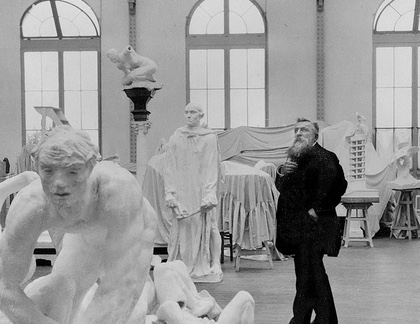
Credit Tallandier, via Bridgeman Images
“Both men produced masterworks that millions
have treasured. But readers finish Corbett’s book feeling that both men
had misspent their lives.“
– David Brooks, “Do You Have to Be a Jerk To Be Great?”
Does anything sting as much as the douchebag who succeeds? It seems we prefer the underdog over the cocky, despicable types, right?
In a rich op-ed piece in the NY Times from July, David Brooks asks the question “Do You Have to Be a Jerk to Be Great?” He pulls his content from two different books, one of which, Range by David Epstein, is waiting for me on my Kindle. The article is a quick read, and Brooks is always good. If you’re not familiar, he’s an expansive thinker, and speaks as one of the moderate grown-ups in any room, whether cultural or political. He also references You Must Change Your Life, Rachel Corbett’s biography of Auguste Rodin and his protégé, the poet Rainer Maria Rilke. The two had singular focus and obsession with work, Rodin telling Rilke ““Travailler, toujours travailler.”Work, always work.
As an artist — and NO, I’m not claiming even a smidgen of the talent in Rodin’s pinky toe — I do relate to the hunger to generate output, while blocking out all distractions of family and friends. Anytime you’ve hit a high water mark with your work or craft, it’s as addictive as heroin, “Uh yes, please, I’ll have another 1000 hits.” But Brooks speaks to the loss of real life, how we forfeit the stuff that matters when we choose to make work the ultimate thing.
Which leads to his headline question. It’s a doozy we wrestle with, or I hope we do. Seems that some folks don’t sweat being a jerk, as long as their hand ends with a Royal Flush, f**k everyone else. But most civil folks with a beating heart, do feel the pendulum swing between insulated ambition and moral obligation to friends and neighbors.
If you’re a Christ follower, there sure as hell better be tension. High capacity leaders will fight the desire to let their ambition have its way, like a flooded river chewing up everything in its path. But the Gospels and pretty much all the New Testament speak to what’s referred to as the upside-down Kingdom of God. In other words, the entirety of the NT (and much of the Old), not only encourage, but command us to surrender our agendas to a greater purpose of obedience and service. Yes, including the big career, bigger house and cozy piña colada life. It’s fascinating to me how even writing the word “obedience” makes me grit my teeth. And it’s gender neutral, ain’t none of us men or women jump to the idea of bowing to a greater sumpin-sumpin than our passions. After all… I. HAVE. MY. DESTINY.
There is tension from my experience. I’ve heard friends say, “But this is business,” as they refer to work as a separate bucket, immune to decency and fair treatment. Sometimes, if our work is directly related to sales, or we operate within a public company, there’s a coldness, a “bottom line” mentality that separates the obligation to do the right thing. A win-at-all-costs ethos exists, which gets heightened when the outcome might affect our paycheck. It gets very difficult when we see the jackass douchebags getting ahead. The ones who are completely self-focused and pretty much show their knives on the way up as they step on and backstab those in their way, or those lending a helping hand. Sounds like Rodin and Rilke fell prey to the same worldview, “They were both horrid to their wives and children.”
The Psalmist below struggles with the tension. He sees the arrogant and shady folks getting ahead, and he damn near loses his sailor’s legs, “my feet had almost slipped.” He’s been the good guy, and feels like the Lone Ranger as others follow their lead, living a care-free life with no consequences other than a big time in Vegas.
Psalm 73
1 Surely God is good to Israel,
to those who are pure in heart.
2 But as for me, my feet had almost slipped;
I had nearly lost my foothold.
3 For I envied the arrogant
when I saw the prosperity of the wicked.
4 They have no struggles;
their bodies are healthy and strong.
5 They are free from common human burdens;
they are not plagued by human ills.
6 Therefore pride is their necklace;
they clothe themselves with violence.
7 From their callous hearts comes iniquity;
their evil imaginations have no limits.
8 They scoff, and speak with malice;
with arrogance they threaten oppression.
9 Their mouths lay claim to heaven,
and their tongues take possession of the earth.
10 Therefore their people turn to them
and drink up waters in abundance.
11 They say, “How would God know?
Does the Most High know anything?”
12 This is what the wicked are like—
always free of care, they go on amassing wealth.
13 Surely in vain I have kept my heart pure
and have washed my hands in innocence.
14 All day long I have been afflicted,
and every morning brings new punishments.
You’ll see how the Psalm ends like many do, that the douchebags will have their comeuppance. Thankfully, Epstein’s data shows that some of us get to see the victory on this side of heaven. The generalists perform better than the specialists. Brooks captures it best in this sentence, “A life devoted to one thing is a stunted life, while a pluralistic life is an abundant one.” I was happy to see that outcome from multiple arenas mentioned in the book, and look forward to diving deeper.
See ya next time. ML
